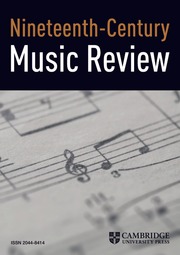This issue marks a turning point for Nineteenth-Century Music Review. After seven successful years at Ashgate, the journal is now being published by Cambridge University Press. The move has created many new and exciting opportunities, including the transition to online (as well as print) publishing via Cambridge Journals Online (see http://journals.cambridge.org/NCM), expansion of the editorial and advisory boards and the support of Cambridge's global sales and marketing teams. These opportunities will help us make the most of our mission to publish scholarship of the highest quality.
Nineteenth-Century Music Review celebrates the field's intellectual, conceptual and topical diversity. It does this by offering readers a wide-ranging supply of articles, reviews and review articles through themed and general issues. Collectively and individually, these issues reflect the journal's commitment to explore and map unknown territories. The current issue on music in nineteenth-century Greece emblemizes this commitment, by locating a distant national culture within international concerns and contexts. Inevitably, translating culture also involves translating language, and in the current issue much attention has been paid to this challenge. Translations which ‘domesticate’ lose their sense of original foreignness, yet those which ‘foreignize’ often retain frustratingly opaque language. Translations in this issue are intended to balance between the two.
If anything characterises Nineteenth-Century Music Review it is its determination to translate individual scholarship into broad-based knowledge, and with its transition to Cambridge University Press that determination is even stronger and more focused. I look forward to many years ahead at Cambridge, expanding our nineteenth-century musicological horizons.


